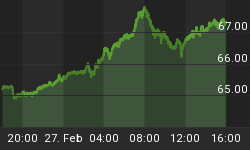The following is excerpted from a commentary originally posted at www.speculative-investor.com on 10th March 2013.
As eventually happens to every dog, over the past three months the world's policy-making fraternity has been having its day. It has been 'fantasyland' for the Ben Bernankes, Mario Draghis, Barack Obamas and Shinzo Abes of the world, with everything seemingly going right for this motley bunch of miscreants.
Policy-makers don't have much control over the effects of monetary inflation. It is therefore often the case that the money supply will be juiced with the aim of boosting one set of prices, only for a completely different set of prices to rise in reaction to the new money. Over the past three months, however, speculators have responded to a flood of new money by bidding-up prices where policy-makers want to see rising prices and not elsewhere. This has created the impression that a genuine economic recovery is in progress and elevated the credibility of the wise men and women responsible for 'managing' the economy.
In the US, the Fed seems to have discovered the perfect monetary formula. Call it Keynesianism with a twist. Don't wait for a decline in "aggregate demand" before implementing counter-cyclical policy; instead, implement policies that stimulate demand even though high and rising prices and rapid economy-wide debt growth indicate that further demand stimulation would be reckless in the extreme. Once upon a time such a policy initiative would have prompted a hefty increase in inflation expectations, but not anymore. As evidenced by the following chart of the "expected CPI", US inflation expectations have flat-lined at the 'ideal' (from the jaundiced perspective of a central banker) level since the introduction of "QE4" last December. Never before has the US central bank acted more crazily and yet never before in the post-Gold-Standard world have inflation expectations been so stable.

Chart Source: www.fullermoney.com
In Japan, the government seems to have discovered the perfect method of exchange-rate manipulation. Up until recently, if policy-makers decided in their infinite wisdom that their country would benefit from a weaker currency they had to actually do something to bring about the weakness. For example, in 2011 the Swiss National Bank had to buy boatloads of euros and sell boatloads of Swiss Francs in order to substantially reduce the Swiss Franc's exchange rate. Not anymore. The Japanese government simply stated its desire for a 20% decline in the Yen's exchange rate, and it quickly happened as if by magic. There was no need to rapidly inflate the Yen supply or do anything else that could aptly be labeled "new". Just mentioning the desire was all it took. That this has hurt more than helped Japan's economy is beside the point. The point is that the markets quickly fell into line with what the policy-makers wanted.
The current set of circumstances isn't the result of a master plan coming together. If this situation could have been deliberately engineered by a group of central planners then it would have arisen long ago. No, this is just randomness at work. From time to time the stars will align favourably for the world's senior policy-makers, but the favourable alignment can't last because it is inherently unstable. For example, in the currency market the desires of some senior policy-makers are soon going to be in serious conflict with the desires other senior policy-makers, and equity prices can't rise for much longer in response to money-supply growth without causing a large-enough rise in inflation expectations to damage the bond market.
Our best guess is that "fantasyland for policy-makers" has less than two months left in its existence.
We aren't offering a free trial subscription at this time, but free samples of our work (excerpts from our regular commentaries) can be viewed at: http://www.speculative-investor.com/new/freesamples.html















